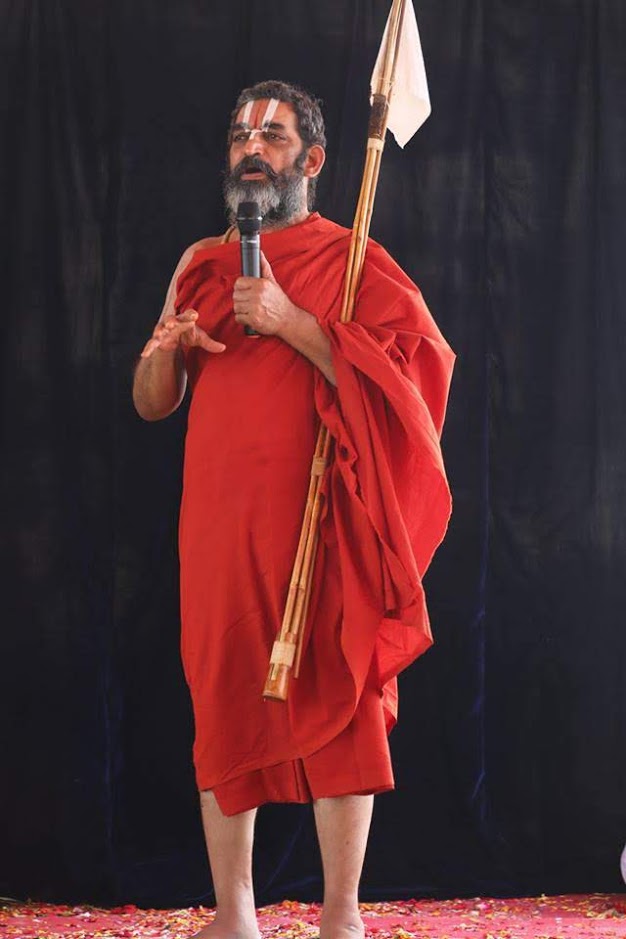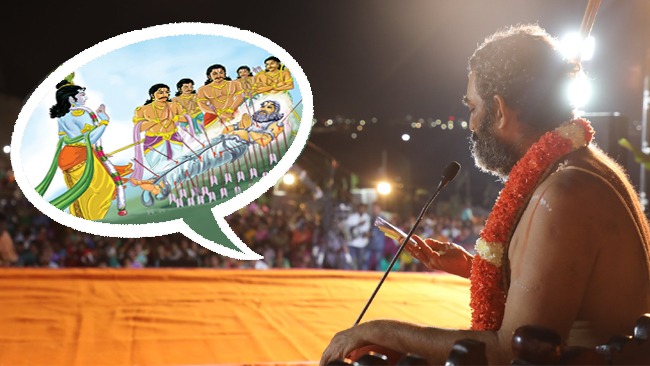Vishnu Sahasra Namam lists 1000 great qualities of the Supreme power, Vishnu (Narayana). The qualities of God, Sulabhaha and Durlabhaha seem like they are contradicting. But, they are in fact elaborating on the nature of God in two different aspects. Shall we find out what makes God sulabhaha (accessible) and what makes Him durlabhaha (inaccessible)?
Sulabhaha (o:m sulabha:ya namaha):
God’s splendour is matchless. No matter what we offer to God, we cannot match to what He gives us. But the beauty is: believe in Him and offer the simplest thing possible such as flowers and He becomes accessible. There was a lady named ‘Trivakra’ who offered sandalwood paste (chandanam) to Krushna. She held him by his collar cloth, and lead Him to her house. (vastre: pragruhya go:vindam)! God can be that easily accessible. That is why He is referred to as Sulabhaha.

Durlabhaha (o:m durlabha:ya namaha):
God is not accessible to those who have their hearts set on other pleasures (tapya:pyanya manaskasya sulabho:na jana:rdanaha – Vishnu dharma). He is also not accessible to those who are unable to control their senses (apra:pyaha ke:savo: ra:jannidriyai rajithairnurna:m – from Bharatha udyo:ga parvam). That is why He is also referred to as Durlabha.
So, is God Sulabhaha or Durlabhaha for you? :)
Another common seemingly contradicting nature of God: Is God ‘guna bhruth’ or ‘nirgunaha’? One part of the scriptures say God has qualities (gunaha / guna bhruth) and another part of the scriptures say God has no qualities (nirgunaha). So, what is true?
Guna Bhruth (o:m guna bhruthe: namaha):
This name means that God conquers ones heart, nurtures and then directs them [sarvasya vasi: sarvasye:sa:naha – sruthi(vedas)]. Bhru is a root-word that means ‘to nurture’. He does all this with a mere thought (sankalpa), ease and with compassion. All such qualities are UNIQUE to Him. Such qualities are NATURAL only to Him.

Nirgunaha (o:m nirgunaya namaha):
This name means that God does not have qualities. Now, this sounds contradictory to Guna Bhruth, right? What the name actually means is that God’s natural qualities are not like that of ours. For example: we have a quality, called jna:na (knowledge). God also has the same quality, jna:nam. But our jna:nam is limited in scope where as His jna:nam is not limited by time, space or any other factor.
Now, is God ‘Guna Bhruth’ or ‘Nirgunaha’? He is both!
Acharyas of Visishta Advaitha Sampradaya have never disregarded any part of the Vedic scriptures. Every part of the Vedic scriptures is accepted. To understand the correct meaning of a word in Vedas, one should have comprehensive clarity on the intent of the scripture as a whole.
Sri Pedda Jeeyar Swamiji used to share a very simple story to explain the controversy prevailing over Guna Bhruth and Nirgunaha very beautifully.

A mother wants to make her son’s favourite snack, aloo pakora. She asks the son to get besan flour (శనగపిండి) from a nearby grocery store. She asks him to check that the flour is good before he buys it. He asks her how to verify that the flour is good or not. She says, ‘if it does not smell, then it’s good flour’.
He goes to the store and asks for besan flour. He takes some of the flour in his hand and smells it. He notices that the flour has a smell. So, he rejects it. He now steps into another store. The same thing happens. He continues to check all the stores near by his house. Every store has the flour, but the flour smelled in the same way. He returns home disappointed. In the meantime, mother was wondering why it was taking this long for her son to get the flour. She quickly checked herself at the store and found out what happened. She knew that he did not understand how to check the flour. By the time he returned, she had already made the snack. He was happy, but was wondering why he couldn’t find the flour that did not smell.
Son asks how she managed to get good flour. He explains that all the stores he checked out had flour that smelled. She then clarifies to him that the flour will have the smell of its own (UNIQUE), its own NATURAL fragrance. What she meant was: to check for any bad smell which indicates that the flour has gone bad, i.e. outdated. When she said, ‘check that it does not smell’, her intent was ‘check that it does not smell bad’.
So, Nirgunaha or Durlabhaha do not mean that God has no qualities or God is not accessible. Their precise meanings are to be carefully studied under the guidance of right acharyas. Visishta Advaitha Sampradaya is known for a great lineage of acharyas who have mastered Vedic wisdom out of immense love for God.
– From the discourse of Sri Chinna Jeeyar Swamiji
– 12th Feb 2019, Vijaya Kiladri
-Sruti vakyam and sloka reference from
Vishnu Sahasra Nama Bhashyam of Parasara Bhattar
-(Vyakhyanam of Mahamahopadhyaya N.C. Raghunatha Chari Garu)
Bhishma Ekadasi 2019 was beautifully celebrated at the foot hills of Vijaya Kiladri, Vijayawada, Andhra Pradesh on the 16th of Feb 2019! Thousands of devotees poured in to initiate themselves with the sthothram from Sri Chinna Jeeyar Swamiji…


